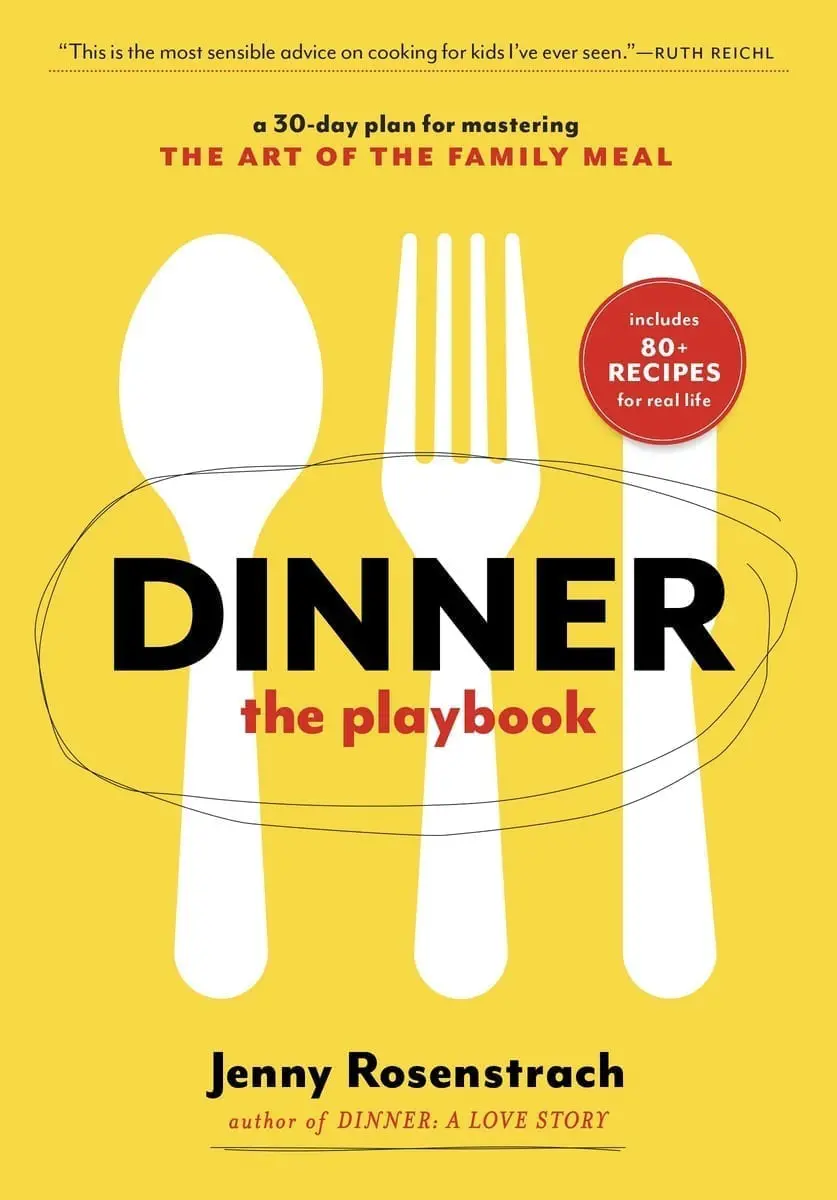Does your dinner rotation read like the children’s menu at [insert name of chain restaurant here]? Are you stopping on the way home for takeout most days of the week? Is cooking at the bottom of your priority list? If so, then Jenny Rosenstrach is here to help. Her book, Dinner: The Playbook, offers a 30-day plan to help you (and your teenagers) get dinner on the table most nights of the week. And not just any dinner. Complete with 60 recipes—including 45 quick-and-easy weeknight meals—Dinner: The Playbook has got something to please most every palette. Your Teen recently caught up with Rosenstrach to find out more.

Trying New Food as a Family
Q: So many of us wonder how we can do family dinner every night. How did you learn to do it?
Rosenstrach: My first book, Dinner: A Love Story, was the story of how we settled into family dinner. Now that my kids are 10 and 12, certain things have changed, but the challenges remain almost the same. We’re still time starved. Everyone is coming home at different times. My daughters play sports and trying to get everyone fed, before or after—and also not eating at 11:00 pm at night—is a challenge.
Q: Tell us your family-dinner story.
Rosenstrach: I grew up with family dinner. My husband grew up with family dinner. We inherited the ritual of family dinner as a birthright and when we were first married, it didn’t occur to us to not sit down and share dinner at the end of the day. It was an important ritual for us.
When our babies came, of course, all bets were off. We were eating at different times and it took us a few years to settle back into a routine. We’d put the kids to bed first and then we would cook our own meal because we really love to cook. We loved the idea of making a meal at the end of the day and sharing that meal. That was the highlight of our day.

Q: So, let’s talk strategy. Whether we like it or not, some planning is a must, right?
Rosenstrach: Absolutely. As soon as you realize that and embrace it, you’ve cracked the nut. There’s no magic button. No one’s going to say, “Here’s the trick.” That doesn’t mean you have to spend your entire weekend cooking. There are all kinds of little ways to prepare ahead that don’t eat into your real life. Every single recipe in Dinner: The Playbook addresses that, because I show the things you can do ahead of time to get yourself prepared.
For example, there’s a Kale Cobb Salad in the book, which is really good, and I love it with shredded chicken. So if you take a minute on the weekend to put the chicken breast on a roasting pan, turn the oven on 375 degrees and roast the chicken, you can then use those for dinner during the week, you can make chicken wraps for lunch. That’s an example of a small investment that pays off big. Making a vinaigrette is another example. If you have that in the fridge, then anything you make for dinner is going to taste fresh and homemade.
Q: Do you plan a meal for everyday? Monday is this, Tuesday is that …
Rosenstrach: We’ve been doing this a long time, but that is the key. You have to just force yourself to do it. Getting organized is 95 percent of the battle, even today. You are dead in the water when you walk in the door and you haven’t thought about dinner all day. We trained ourselves to think about dinner at the beginning of the week. On Sunday, we shop for the whole week and come up with a rough plan. So when we walk in the door, we know what is happening.
If you have a week’s worth of solid meals that you can make without a recipe, then you are in really good shape. You don’t need more than that. Have some things you’re really confident making, decide to master them, and then that’s the first step.
The recipes in the book are a great place to start. They are so simple. There are 60 recipes and 45 of them are designed for someone who just don’t know where to start. Who thinks, “Cooking is the lowest item on my priority list, but family dinner is the highest, so how do we make them come together?” Also, the point I try to get across on my blog and in the book is that dinner does not have to be fancy. And, of course, we’re going to order pizza sometimes. This is the real world. We’d be crazy not to give ourselves a break. But there are so many things you can do that take less time than calling for takeout and that are healthy and wholesome and you can feel good about giving your kids. Have some recipes like that, which you can make on autopilot.
Q: What else?
Rosenstrach: Try to think about dinner in the morning, even though it’s the last thing in the world you want to think about when you are trying to get everyone out the door, including yourself. But I find just taking a minute to think about it pays such dramatic dividends at the end of the day. Just lay the groundwork. The most important thing is just to decide what it’s going to be. If you have a plan, you don’t have to figure it out when you get home.
Also see what you can do that takes a couple minutes in the morning to help get the ball rolling that night. There’s a recipe in the book for Buttermilk Herb-Baked Chicken Tenders. Basically you dump your chicken breast into a bowl with buttermilk, mustard and lots of herbs and let it marinate all day in the fridge. I know marinating is a new concept for a lot of people, but for me, whenever I do it, it feels great knowing dinner is in the fridge. Even if you just cut an onion or put a pot of water on the stove, it helps.
Q: Are your girls picky?
Rosenstrach: No, but there are things they are stubborn about not eating. I’m that way too. I still won’t touch olives. When we started this whole experiment, my youngest was super picky. I kind of credit this whole experiment with teaching her how to approach the table with an open mind. I think the danger with picky eating, for us anyway, is that we were just cooking the things she liked because we didn’t want a fight every night. We really wanted to change that.
She did not like every single meal we made her during those 30 days, but by the end of the month, she was so used to being surprised by what was on the table, there was a nice shift in attitude. Instead of fighting, she would get a little excited about it. She learned to flex her adventure muscle. She would not touch fish when we started the whole thing, and now I’m the obnoxious parent who brags about her kids eating fish. Was it evolving taste buds? Sure. But we also forced ourselves to expose her. It takes a kid a long time to get used to the idea of eating something that is initially not appealing to them. It takes time, patience and trying new things.
Q: What has eating dinner together done for your family?
Rosenstrach: I want to create a comfortable space where we can bring up anything and talk about anything and so far that has worked out nicely. I know my daughters think about dinner the way I grew up thinking about dinner. “Of course we’re sitting down to dinner.” I hope when they are teenagers and start moving away from me, they’ll always come back. They’ll see dinner as the magnetic north of the day, which is how I’ve always seen it too. And I hope they do it with their own families.





